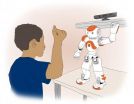(Press-News.org) Previous research has indicated that salt may alter the autoimmune response, which is implicated in the development of multiple sclerosis (MS), but it is not clear if it has any direct effect on the course of the disease itself.
The researchers assessed the blood and urine samples of 70 people with the relapsing-remitting form of MS to check for levels of salt; a marker of inflammatory activity called creatinine; and vitamin D, low levels of which have been linked to the disease.
This group were asked to provide urine samples on three separate occasions over a period of nine months to monitor changes in dietary salt intake, and their neurological health was then tracked for two years, between 2010 and 2012.
By way of comparison, urinary salt levels were measured in a second group of 52 people with the same type of MS between June and July 2013.
Salt intake averaged just over 4 g per day in both groups, but ranged from under 2 g (low) to 2-4.8 g (moderate) to 4.8 g or more a day (high), with men tending to have a higher daily intake than women.
After taking account of influential factors, such as smoking, age, gender, length of time after diagnosis, weight, treatment and circulating vitamin D, the analysis indicated a link between levels of dietary salt and worsening symptoms.
Compared with those consuming the least salt every day, those on moderate to high intake in the first group had around three more episodes of worsening symptoms, and were almost four times as likely to have these episodes.
The researchers then looked at x-rays and scans to find out if the disease had progressed further, and once again found a link between dietary salt intake and radiological evidence of further deterioration.
Those whose dietary salt intake was high were almost 3.5 times as likely to have radiological signs of further progression.
Similar results were obtained for the comparison group.
This is an observational study, so no definitive conclusions about cause and effect can be drawn. And higher levels of salt in the urine may reflect greater disease activity rather than the other way round, the authors point out.
But high salt intake is implicated in various aspects of poor health, they say. And their findings suggest further research into whether dietary salt reduction could ease MS symptoms or slow the progression of the disease might now be warranted, they add.
INFORMATION:
High dietary salt may worsen multiple sclerosis symptoms
And is linked to greater risk of further neurological deterioration
2014-08-29
ELSE PRESS RELEASES FROM THIS DATE:
Plain cigarette packs don't hurt small retailers or boost trade in illicit tobacco
2014-08-29
The findings suggest there is no evidence for these particular arguments against the policy, put forward by the tobacco industry, say the researchers.
Australia was the first country in the world to introduce standardised packaging for tobacco products in December 2012. New Zealand, Ireland, and the UK are currently considering similar legislation.
The researchers wanted to find out if the policy would deter people from buying their tobacco from small independent retailers, prompt a rise in the availability of cheap products sourced from Asia, and increase the use of ...
New model predicts patients with type 1 diabetes who will go on to develop major complications
2014-08-29
New research published in Diabetologia (the journal of the European Association for the Study of Diabetes) presents a new model for predicting which patients with type 1 diabetes will go on to develop major complications, through easily and routinely measured risk factors. The research is by Assistant Professor Sabita Soedamah-Muthu, Wageningen University, Netherlands, and colleagues.
To create the model, data were analysed from 1,973 participants with type 1 diabetes followed for seven years in the EURODIAB Prospective Complications Study, and strong prognostic factors ...
The Lancet: China-themed issue
2014-08-29
China's rapid emergence as a global power has coincided with a series of unprecedented challenges to Chinese people's health. The fifth China themed issue of The Lancet provides a picture of the complex health issues facing China, and looks at how better health outcomes for Chinese people can be achieved into the future.
In this issue, the journal highlights the dire consequences that urbanisation and increasing affluence are having on China's chronic disease burden. The journal also reports systematic and comprehensive assessments of China's health-care system and revamping ...
Study finds shortcomings in doctor-patient discussions about transplantation
2014-08-29
Highlights
When dialysis patients reported discussions about transplantation with clinicians, they had a nearly 3-fold increased likelihood of being listed for transplantation, but clinician-reported discussions did not increase a patient's likelihood of being listed.
In almost one-third of cases, clinicians reported that they had discussed transplantation with a particular dialysis patient, but the patient said that nobody had discussed it with them.
Washington, DC (August 28, 2014) — In a study of dialysis patients, those who reported that they had discussed ...
Complications of tube insertion in ears not worse for kids with cleft lip/palate
2014-08-28
Bottom Line: Children with cleft lip and/or palate (CLP) have no worse complications from ventilation tube (VT) insertion in their ears to treat otitis media with effusion (OME, a buildup of fluid in the ear) or acute otitis media (AOM, a common ear infection), two conditions which can result in hearing loss.
Author: Ian Smillie, M.R.C.S. Ed., of the Royal Hospital for Sick Children, Glasgow, Scotland, and colleagues.
Background: CLP is a common birth defect in children, occurring in 1 of 700 births. Optimizing hearing in children with CLP is important to avoid problems ...
Socially-assistive robots help kids with autism learn by providing personalized prompts
2014-08-28
LOS ANGELES - August 28, 2014: This week, a team of researchers from the USC Viterbi School of Engineering will share results from a pilot study on the effects of using humanoid robots to help children with autism practice imitation behavior in order to encourage their autonomy. Findings from the study, entitled "Graded Cueing Feedback in Robot-Mediated Imitation Practice for Children with Autism Spectrum Disorders," will be presented at the 23rd IEEE International Symposium on Robot and Human Interactive Communication (RO-MAN) conference in Edinburgh, Scotland, on Aug. ...
Flapping baby birds give clues to origin of flight
2014-08-28
How did the earliest birds take wing? Did they fall from trees and learn to flap their forelimbs to avoid crashing? Or did they run along the ground and pump their "arms" to get aloft?
The answer is buried 150 million years in the past, but a new University of California, Berkeley, study provides a new piece of evidence – birds have an innate ability to maneuver in midair, a talent that could have helped their ancestors learn to fly rather than fall from a perch.
The study looked at how baby birds, in this case chukar partridges, pheasant-like game birds from Eurasia, ...
Prions can trigger 'stuck' wine fermentations, researchers find
2014-08-28
A chronic problem in winemaking is "stuck fermentation," when yeast that should be busily converting grape sugar into alcohol and carbon dioxide prematurely shuts down, leaving the remaining sugar to instead be consumed by bacteria that can spoil the wine.
A team of researchers including UC Davis yeast geneticist Linda Bisson has discovered a biochemical communication system behind this problem. Working through a prion -- an abnormally shaped protein that can reproduce itself -- the system enables bacteria in fermenting wine to switch yeast from sugar to other food sources ...
Researchers use NASA and other data to look into the heart of a solar storm
2014-08-28
A space weather storm from the sun engulfed our planet on Jan. 21, 2005. The event got its start on Jan. 20, when a cloud of solar material, a coronal mass ejection or CME, burst off the sun and headed toward Earth. When it arrived at our planet, the ring current and radiation belts surrounding Earth swelled with extra particles, while the aurora persisted for six hours. Both of these are usually signs of a very large storm – indeed, this was one of the largest outpouring of solar protons ever monitored from the sun. But the storm barely affected the magnetic fields around ...
After Great Recession, Americans are unhappy, worried, pessimistic, Rutgers study finds
2014-08-28
NEW BRUNSWICK, N.J. – The protracted and uneven recovery from the Great Recession has led most Americans to conclude that the U.S. economy has undergone a permanent change for the worse, according to a new national study at Rutgers. Seven in 10 now say the recession's impact is permanent, up from half in 2009 when the recession officially ended, according to the John J. Heldrich Center for Workforce Development.
Among key findings in "Unhappy, Worried and Pessimistic: Americans in the Aftermath of the Great Recession," the center's latest Work Trends report, are:
Despite ...
LAST 30 PRESS RELEASES:
AMS Science Preview: Hawaiian climates; chronic pain; lightning-caused wildfires
Researchers advance detection of gravitational waves to study collisions of neutron stars and black holes
Automated machine learning robot unlocks new potential for genetics research
University of Toronto scientists appointed as GSK chairs will advance drug delivery research and vaccine education tools for healthcare professionals
Air pollution and depression linked with heart disease deaths in middle-aged adults
More efficient molecular motor widens potential applications
Robotic nerve ‘cuffs’ could help treat a range of neurological conditions
Researchers identify targets in the brain to modulate heart rate and treat depressive disorders
Findings of large-scale study on 572 Asian families supports gene-directed management of BRCA1 and BRCA2 gene carriers in Singapore
Many children with symptoms of brain injuries and concussions are missing out on vital checks, national US study finds
Genetic hope in fight against devastating wheat disease
Mutualism, from biology to organic chemistry?
POSTECH Professor Yong-Young Noh resolves two decades of oxide semiconductor challenges, which Is published in prestigious journal Nature
Could fishponds help with Hawaiʻi’s food sustainability?
International network in Asia and Europe to uncover the mysteries of marine life
Anthropologist documents how women and shepherds historically reduced wildfire risk in Central Italy
Living at higher altitudes in India linked to increased risk of childhood stunting
Scientists discover a new signaling pathway and design a novel drug for liver fibrosis
High-precision blood glucose level prediction achieved by few-molecule reservoir computing
The importance of communicating to the public during a pandemic, and the personal risk it can lead to
Improving health communication to save lives during epidemics
Antimicrobial-resistant hospital infections remain at least 12% above pre-pandemic levels, major US study finds
German study finds antibiotic use in patients hospitalised with COVID-19 appears to have no beneficial effect on clinical outcomes
Targeting specific protein regions offers a new treatment approach in medulloblastoma
$2.7 million grant to explore hypoxia’s impact on blood stem cells
Cardiovascular societies propel plans forward for a new American Board of Cardiovascular Medicine
Hebrew SeniorLife selected for nationwide collaborative to accelerate system-wide spread of age-friendly care for older adults
New tool helps identify babies at high-risk for RSV
Reno/Sparks selected to be part of Urban Heat Mapping Campaign
Advance in the treatment of acute heart failure identified
[Press-News.org] High dietary salt may worsen multiple sclerosis symptomsAnd is linked to greater risk of further neurological deterioration


